June 2023 FloridAgriculture eNewsletter
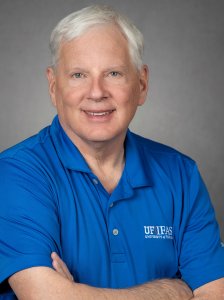 By J. Scott Angle
By J. Scott Angle
[email protected]
@IFAS_VP
You get first shot at the latest blueberry varieties developed in Gainesville, strawberries from Balm, peanuts from Marianna, forages tested in Ona, tropical foliage from Apopka, sweet corn from Belle Glade and squash from Homestead.
The common thread running through this tapestry of discovery is the Florida Foundation Seed Producers (FFSP). John Beuttenmuller and his team make sure that our innovation machine runs for you.
FFSP works closely with the UF/IFAS plant breeding team on cultivars that thrive under Florida conditions. When those varieties are ready for release, Florida farmers get the opportunity to use them, generally years ahead of international competitors.
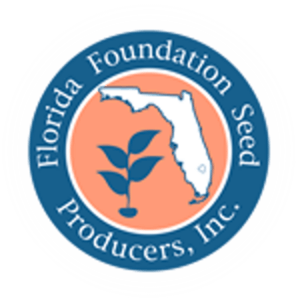 Meanwhile, when that head start plays out and you’re moving on to new varieties, FFSP eventually licenses cultivars abroad to protect its intellectual property, and they reinvest that money into Florida-focused innovation.
Meanwhile, when that head start plays out and you’re moving on to new varieties, FFSP eventually licenses cultivars abroad to protect its intellectual property, and they reinvest that money into Florida-focused innovation.
It’s hard to imagine that we’d have a new blueberry lab in Gainesville without this revenue stream. You’re getting an innovation factory for the next discovery funded in significant part from royalties from the last breakthrough.
FFSP licensing royalties have also been used to build greenhouses for our strawberry breeding team. And one of the high-profile gifts of our last capital campaign was the establishment of the FFSP Plant Breeding Endowment. It sets up a friendly competition to find the most potentially impactful new breeding projects at UF and brings in representatives from industry to pick which ones to fund.
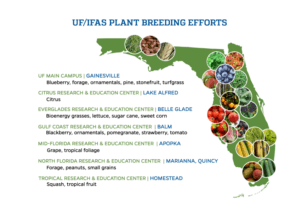 FFSP does more than promote new versions of old standbys. It is central to the search for the next new Florida crop. Namely, it’s been a prime sponsor of 33 projects aimed at figuring out if enterprises ranging from barley to vanilla, olives to vegetable high tunnels, are the best bet for a new commercially viable commodity.
FFSP does more than promote new versions of old standbys. It is central to the search for the next new Florida crop. Namely, it’s been a prime sponsor of 33 projects aimed at figuring out if enterprises ranging from barley to vanilla, olives to vegetable high tunnels, are the best bet for a new commercially viable commodity.
And now that we’ve got 15 new faculty with expertise in artificial intelligence, we need to jumpstart their work. FFSP helped light the fuse by providing much of the funding to bring together 11 teams around projects ranging from accelerated precision plant breeding to automated strawberry yield protection. We expect AI technologies, licenses and startup companies to result.
Beuttenmuller is a friend of the Farm Bureau. He sits on your Peanut and Cotton Advisory Committee. He’s long made sure Farm Bureau is represented on his FFSP board. Nate Jameson, whose wife Anna is on the Sumter County Farm Bureau board, is FFSP’s board vice president. Kevin Morgan served on the board until his retirement as assistant to the former Farm Bureau president. Another former FFBF administrator, Jaime Jerrells, served on the FFSP board and continues to do so in her new role for the commissioner of agriculture.
Beuttenmuller is a great example of someone who helps ensure that UF/IFAS innovation is relevant to Florida farmers by actually getting it into your hands through commercialization.
New crop varieties are intellectual property. By protecting that property, Beuttenmuller and FFSP are protecting Florida agriculture.
Scott Angle is the University of Florida’s Senior Vice President for Agriculture and Natural Resources and leader of the UF Institute of Food and Agricultural Sciences (UF/IFAS).
 Calling Florida Farmers and Ranchers: Join our Fight Against Food Insecurity and Help us feed Florida with Florida-Grown products!
Calling Florida Farmers and Ranchers: Join our Fight Against Food Insecurity and Help us feed Florida with Florida-Grown products!
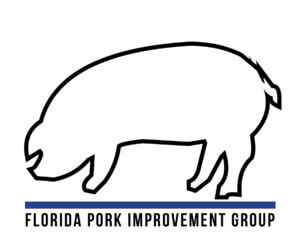 The election of pork producer delegate candidates for the 2024 National Pork Producers (Pork Act) Delegate Body will take place at 10:00am on Thursday, July 27, 2023 in conjunction with a Board of Directors meeting of the Florida Pork Improvement Group at the Florida FFA Association office, 5600 SW 34th St., Gainesville, FL 32608. All Florida pork producers are invited to attend.
The election of pork producer delegate candidates for the 2024 National Pork Producers (Pork Act) Delegate Body will take place at 10:00am on Thursday, July 27, 2023 in conjunction with a Board of Directors meeting of the Florida Pork Improvement Group at the Florida FFA Association office, 5600 SW 34th St., Gainesville, FL 32608. All Florida pork producers are invited to attend. By J. Scott Angle
By J. Scott Angle Meanwhile, when that head start plays out and you’re moving on to new varieties, FFSP eventually licenses cultivars abroad to protect its intellectual property, and they reinvest that money into Florida-focused innovation.
Meanwhile, when that head start plays out and you’re moving on to new varieties, FFSP eventually licenses cultivars abroad to protect its intellectual property, and they reinvest that money into Florida-focused innovation.  FFSP does more than promote new versions of old standbys. It is central to the search for the next new Florida crop. Namely, it’s been a prime sponsor of 33
FFSP does more than promote new versions of old standbys. It is central to the search for the next new Florida crop. Namely, it’s been a prime sponsor of 33 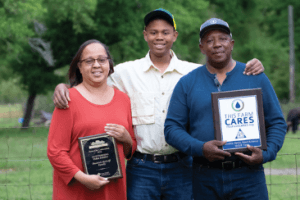 As the voice of agriculture,
As the voice of agriculture, 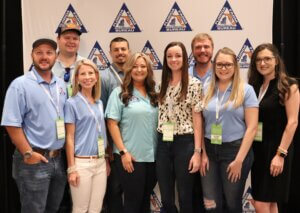 Young Farmers & Ranchers are between the ages of 18-35 who have a desire to network, share ideas, participate in community projects and hone their leadership skills. The Florida Farm Bureau has an array of opportunities for this group of young agriculturists to become strong leaders for the future of agriculture.
Young Farmers & Ranchers are between the ages of 18-35 who have a desire to network, share ideas, participate in community projects and hone their leadership skills. The Florida Farm Bureau has an array of opportunities for this group of young agriculturists to become strong leaders for the future of agriculture.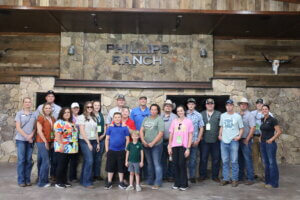 choose from including
choose from including 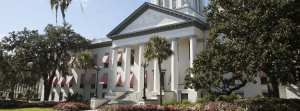
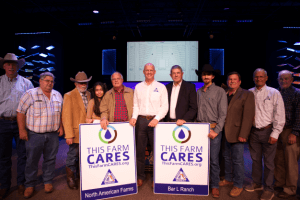 Practicing sustainability is a way of life for Florida farmers and ranchers. More than 10 million acres are dedicated to agriculture. These lands provide environmental benefits such as preserving the natural landscape and numerous ecosystem services. The careful stewardship of these lands contributes to clean air, water and provides wildlife habitat. Forests and rangeland support carbon sequestration, helping combat climate change.
Practicing sustainability is a way of life for Florida farmers and ranchers. More than 10 million acres are dedicated to agriculture. These lands provide environmental benefits such as preserving the natural landscape and numerous ecosystem services. The careful stewardship of these lands contributes to clean air, water and provides wildlife habitat. Forests and rangeland support carbon sequestration, helping combat climate change.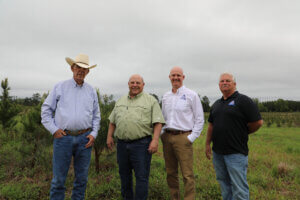 American Farm Bureau President, Zippy Duvall traveled to Washington and Jackson Counties March 28-29 to discuss issues that Florida producers are facing and to explore the diversity of farming in the area. On Tuesday, along with Florida Farm Bureau President Jeb Smith, President Duvall spent the morning learning about the process and benefits of silvopasture and he participated in a roundtable discussion with peanut and cotton producers over lunch. The next stop was a cattle ranch in Chipley, owned by Washington County Farm Bureau President George Fisher, and then to the Enviva Pellet Mill in Cottondale.
American Farm Bureau President, Zippy Duvall traveled to Washington and Jackson Counties March 28-29 to discuss issues that Florida producers are facing and to explore the diversity of farming in the area. On Tuesday, along with Florida Farm Bureau President Jeb Smith, President Duvall spent the morning learning about the process and benefits of silvopasture and he participated in a roundtable discussion with peanut and cotton producers over lunch. The next stop was a cattle ranch in Chipley, owned by Washington County Farm Bureau President George Fisher, and then to the Enviva Pellet Mill in Cottondale.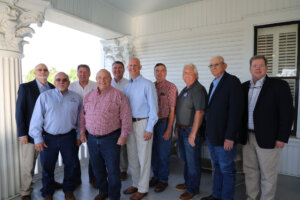 To finish up the day, President Duvall spoke at the Washington County Farm Bureau Annual Meeting. Topics of his address included the importance of the upcoming Farm Bill, challenges with labor and Waters of the US (WOTUS). President Duvall said that with there being 260 newly elected officials that have never voted on a Farm Bill, it is critical for agriculture to continue the pressure to pass a Farm Bill to protect the livelihood of farming and ranching.
To finish up the day, President Duvall spoke at the Washington County Farm Bureau Annual Meeting. Topics of his address included the importance of the upcoming Farm Bill, challenges with labor and Waters of the US (WOTUS). President Duvall said that with there being 260 newly elected officials that have never voted on a Farm Bill, it is critical for agriculture to continue the pressure to pass a Farm Bill to protect the livelihood of farming and ranching.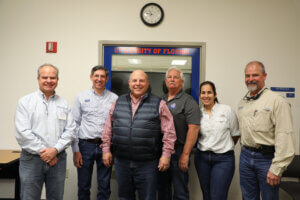 On Wednesday morning, President Duvall met with Farm Bureau leaders over breakfast to discuss the role county Farm Bureaus play in the legislative process. The next stop on day two was a visit to the UF/IFAS Peanut and Cattle Breeding Unit in Greenwood. The tour ended with a trip to Marianna where the group visited a Satsuma farm.
On Wednesday morning, President Duvall met with Farm Bureau leaders over breakfast to discuss the role county Farm Bureaus play in the legislative process. The next stop on day two was a visit to the UF/IFAS Peanut and Cattle Breeding Unit in Greenwood. The tour ended with a trip to Marianna where the group visited a Satsuma farm.